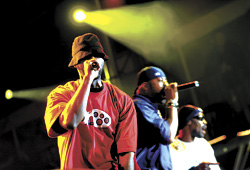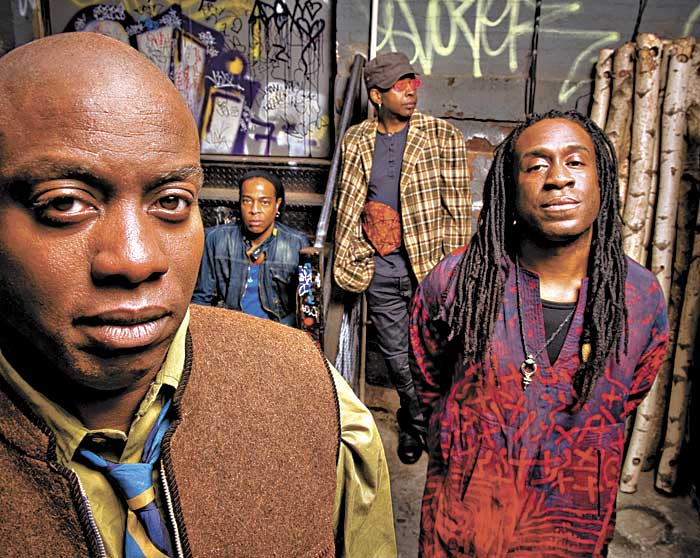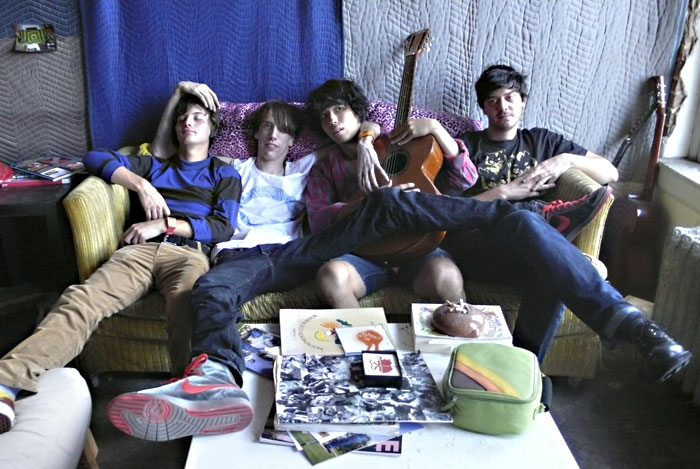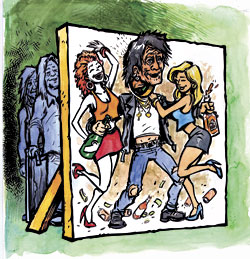It’s either some really nasty public infighting among one of hip-hop’s beloved dynasties or one hell of a publicity stunt. Six years after legendary Staten Island crew Wu-Tang Clan’s last album, Iron Flag, the group announced the impending release of 8 Diagrams, its fifth album. All nine members would appear on it, including (posthumously) founding member Ol’ Dirty Bastard, who passed away three years ago due to a drug overdose.
Or would they? Ghostface Killah, the group’s most commercially viable solo member, seemed to be boycotting the early stages of the recording process, although he eventually relented. Initially upset over financial dealings with the group’s “hierarchy” (which, one assumes, includes producer RZA and label owner Steve Rifkind), he blew his stack when 8 Diagrams was slated for release on the same December date as his new solo album, The Big Doe Rehab.
RZA eventually relented and pushed Wu’s release date back, but then there was another allegation from Ghost: RZA was “fumbling the ball” creatively. Raekwon had even harsher words in the press for the Clan’s de facto ringleader; he accused RZA of “pimping” him financially and of betraying the group’s ideals via the beats on the new album. “We make ‘punch you in the face’ music,” he complained in interviews, also calling RZA a “hip-hop hippie.”
In some ways, Raekwon is right—8 Diagrams is a quieter, more spiritual album that represents a significant departure for Wu-Tang. For years Wu have been a rare force in hip-hop that both critics and the masses have gotten behind, but the newest album seems largely for the critics. If this is the Clan’s last album, as many fear, it seems geared toward RZA’s legacy.
The group’s raw, signature sound—exemplified on tracks from their beloved debut, Enter the Wu-Tang (36 Chambers), like “Bring Da Ruckus”—is largely absent in favor of more live instrumentation, softer beats, and sung hooks, many with an R&B flavor. A top-notch roster of crooners has been recruited, from the ex–lead singer of the Manhattans, Gerald Alston, to Sunny Valentine and Erykah Badu.
Thematically, the album shows a Wu-Tang Clan that’s all grown up. The first track, “Campfire,” begins with movie dialogue from the Hong Kong martial arts flick Eight Diagram Pole Fighter—from which the album also gets its name—extolling the virtues of kindness, faith, and patience. “I’m trying to live and raise kids,” says Wu’s honorary ninth member, Cappadonna, on the song’s third verse. Inspectah Deck delivers a memorable eulogy to ODB on the slow tribute to the fallen Clansman, “Life Changes”: “I share the blame/’Cause you was callin’ for help, kid/Shoulda, coulda, woulda/Had the time/I was selfish/I carry on your struggle/Each day it really hurts me/I really miss you Russell/Hope you forgive me Dirty.”
That’s not to say that the rank-and-file usual suspects aren’t up to their normal blunt-smoking, rambunctious behavior. Method Man has never sounded more on point, from his hypnotizing stanzas on “Get Them Out Ya Way Pa” to his furious, insistent closing verse on “The Heart Gently Weeps.”
The latter track—which samples the Beatles and features George Harrison’s son, Dhani, on rhythm guitar—is emblematic of the album as a whole. Bloated and stylistically all over the place, it somehow stays together largely thanks to an impassioned performance, this time from Ghostface, whose tale of a shoot-out in a Pathmark store comes from out of nowhere. “I stood up to face a barrel/He’s holding a shiny pound,” he raps. “It’s him, he want revenge/I murdered his Uncle Tim/I sold him a bag of dope/His wife came and copped again.”
Another highlight is the epic “Stick Me for My Riches,” which begins with well over a minute of Alston’s mesmerizing singing and features yet more standout verses from Method Man and Inspectah Deck.
Despite Raekwon’s grumblings, RZA’s beats hold the whole thing together. Understated, cerebral, and anchored by guitar and piano, they ensure that 8 Diagrams will only get better with age. Though RZA’s unilateral moves may ultimately sabotage the group, putting together an album this cohesive with nine feuding members (one of whom is deceased) is nothing short of miraculous.








